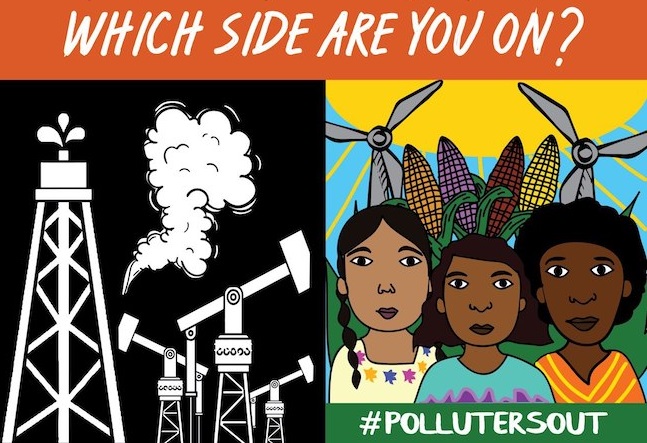Although these negotiations are formally between states, because we live in a world so significantly shaped by trans-national corporations, the reality is that corporate power influences the agenda, specific outcomes, and the overall direction of the talks in a big way.
Don’t believe us? Check out this epic thread on twitter which points out some of the cosy connections and easy access enjoyed by these pimps of misery.
This is not just the word of activists. AFP reached the same conclusions.
The issue has been around since the first day of the talks, and actually before. Jeremy Leggett’s “The Carbon War” is an illustrative glimpse into corporate interference in the mid to late-90s. Here’s a report about how it all works.
The trend has continued into the Paris Agreement era.
It’s actually something the fossil fuel industry has itself boasted about. However, more and more people are waking up to the greenwash tactic deployed by the largest polluters.
After years of highlighting the situation without being able to do anything about it, four years ago some members of the climate justice community identified a potential policy avenue through negotiations under “arrangements for intergovernmental meetings.” As Corporate Accountability write in their blog (below), together we launched a “campaign calling to kick Big Polluters out of climate policy. Backed by hundreds of thousands of people like you around the world, government delegates from the Global South have been uniting to demand a conflict-of-interest policy that could protect the U.N. climate treaty from industry interference.”
Although “Powerful Global North governments, like the U.S. and EU, have consistently sided with Big Polluters to maintain the status quo” the issue was still on the agenda this year. And it was most certainly on our agenda.
The above press conference webcast and the video below explain a little bit more about the efforts being taken.
However, because “arrangements for intergovernmental meetings” is not explicitly a space to talk about conflicts of interest and how to handle impropriety, the deck is stacked in favour of countries who don’t want to deal with the issue. Naturally, this was exactly what they did – putting forward proposals on other topics, such as the frequency of meetings, to deliberately provoke long-winded conversations and crowd out the agenda. In spite of developing countries and civil society raising concerns about the dangerous influence of vested interests, the issue did not advance and the decision coming out of Bonn represents a concerted effort on behalf of developed countries like the US, EU, Japan, and Norway, including by reverting to a classic divide-and-rule tactic as suggested below.
The inside story was not well covered by journalists, who instead ran with a fictitious “the science has been deleted from the Paris Agreement” angle. But AFP did devote some coverage, exposing the ludicrous position of developed countries.
Although the campaign to limit the influence of vested interests in the UNFCC must carry on to another round without many major breakthroughs (yet) the Overton window has absolutely shifted, to the point where the below is possible.


thank you for sharing with us, I believe this website genuinely stands out : D.
I like this weblog very much, Its a rattling nice place to read and obtain information.
skin care pharmacy on line discount drugs online pharmacy
online pharmacy without a prescription canadian prescriptions online canadian pharmacies-24h
cialis online america cialis paypal pay with get online cialis without prescription overnight
rthtylvla rlepk gshpbwk stgs oexotcyjxgmwjzl